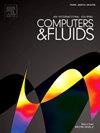Adaptive GSIS for rarefied gas flow simulations
IF 3
3区 工程技术
Q3 COMPUTER SCIENCE, INTERDISCIPLINARY APPLICATIONS
引用次数: 0
Abstract
The parallel solver of the general synthetic iterative scheme (GSIS), as recently developed by Zhang et al. in Comput. Fluids 281 (2024) 106374, is an efficient method to find the solution of the kinetic equation deterministically. However, it consumes a significant computational memory due to the discretization of molecular velocity space in hypersonic flows. In this paper, we address this issue by introducing the adaptive GSIS, where the kinetic equation is applied only in rarefied regions when the local Knudsen number exceeds a reference value, . In contrast, the Navier–Stokes equations, with and without the high-order corrections to the constitutive relations, are applied in the continuum and rarefied regimes, respectively. Numerical results indicate that setting yields acceptable outcomes. With the adaptive GSIS, the computational memory and time can be significantly reduced in near-continuum flows, e.g. 24 and 7 times, respectively, in the simulation of rarefied gas flow passing the International Space Station.
用于稀薄气体流动模拟的自适应GSIS
通用综合迭代方案(GSIS)的并行求解器,最近由Zhang等人在Comput中开发。流体281(2024)106374是确定求解动力学方程的有效方法。然而,由于高超声速流动中分子速度空间的离散化,它消耗了大量的计算内存。在本文中,我们通过引入自适应GSIS来解决这一问题,其中动力学方程仅在局部Knudsen数超过参考值Knref时应用于稀疏区域。相比之下,Navier-Stokes方程,有和没有高阶修正的本构关系,分别适用于连续体和稀薄状态。数值结果表明,将Knref=0.01设置为可接受的结果。采用自适应GSIS,在近连续流中,计算内存和时间显著减少,例如在稀薄气体通过国际空间站的模拟中,分别减少了24倍和7倍。
本文章由计算机程序翻译,如有差异,请以英文原文为准。
求助全文
约1分钟内获得全文
求助全文
来源期刊

Computers & Fluids
物理-计算机:跨学科应用
CiteScore
5.30
自引率
7.10%
发文量
242
审稿时长
10.8 months
期刊介绍:
Computers & Fluids is multidisciplinary. The term ''fluid'' is interpreted in the broadest sense. Hydro- and aerodynamics, high-speed and physical gas dynamics, turbulence and flow stability, multiphase flow, rheology, tribology and fluid-structure interaction are all of interest, provided that computer technique plays a significant role in the associated studies or design methodology.
 求助内容:
求助内容: 应助结果提醒方式:
应助结果提醒方式:


